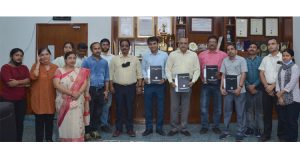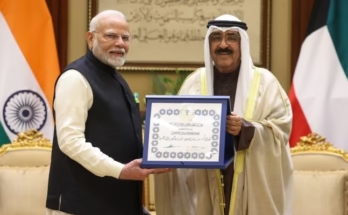 Jamshedpur: CSIR-NML transferred e-waste recycling technologies to a Kolkata-based firm M/s Metaore Recycling Private Ltd., on Friday. Metaore recycling plant will be the first plant in Eastern India that will work on the zero waste concepts, and it will be a significant gift to society after the corona pandemic.
Jamshedpur: CSIR-NML transferred e-waste recycling technologies to a Kolkata-based firm M/s Metaore Recycling Private Ltd., on Friday. Metaore recycling plant will be the first plant in Eastern India that will work on the zero waste concepts, and it will be a significant gift to society after the corona pandemic.
Besides others, Director NML Dr. Indranil Chattoraj, Project Leader, Dr. Manis Kumar Jha, Head MER, Dr. Sanjay Kumar, Sr. Principal Scientist, Dr. Jhumki Hait, Principal Scientist, Dr. Ranjeet Kumar Singh and a group of researchers Dr. Pankaj Kumar Choubey, Rekha Panda, Om Shankar Dinkar and from the RPBD side, Dr. G.V.S. Murthy and Dr. Bina Kumari were altogether present on occasion.
Dr. Anjani Kumar Sahu actively participated always to bridge the NML with the media for advertisement and dissemination of e-waste recycling technology in the society, informed a PR official of NML. The founder and Managing Director of M/s Metaore Recycling Pvt. Ltd., Kolkata, Sourabh Rungta, from Chaibasa, to expand his business now entering into the business of e-waste recycling.
Keeping in view of immense concern of limited natural resources which is going to exhaust very soon in the near future. Speaking on occasion Rungta said, “I’m very happy to be a part of CSIR-NML by taking the e-waste recycling technology to serve the nation by making pollution-free society as well as conservation of natural resources for the future generation”.
Director NML Dr. Indranil Chattoraj said, “In recent past NML has transferred a number of indigenous technology to Indian company and hope in future we can transfer more to make India as e-waste free society”.
On this occasion, Dr. Sanjay Kumar, Head MER division, expressed his happiness and said, “NML will transfer more technologies in the near future”.
Notably, in the past, NML has transferred several technologies to national and international industries and research organisations. M/s Metaore Recycling Pvt. Ltd. Kolkata will process non-ferrous, valuable, and precious metals (Cu, Ni, Al, Au, Pd, Ag, Pt, etc), and apart from that, they will recycle all the materials present in it based on zero waste concepts.
E-waste: Waste to Wealth
The electronic revolution has made our life full of comforts. Employment opportunities have increased along with the expansion of communication systems through various electronic inventions and encourage business activities. The generation of electronic waste has given rise to a new environmental problem.
“E-waste” refers to electronic waste, which is not suitable for its use. Therefore, countries like India are worried about the increasing import of such e-waste due to developing countries being considered as the safest dumping ground. Due to the fast-growing electronic revolution in the world’s countries, the dependence of the common people on this side is increasing. India is a major consumer of this “e-waste” that is becoming a threat to the environment and a source of serious diseases like cancer. According to an estimate, more than 400 million mobile phones are being generated in India. Companies that manage e-waste believe that a mobile phone can be recycled up to 79%, in the same way, recycling of computers can also give rise to new products.
Mobile phones, laptops, televisions, photocopiers, fax machines, calculators and the e-waste of old computers that have become waste are coming out as major issues such as soil pollution, water and air pollution including many serious diseases.
Unorganized work going on
The disposal of e-waste is largely unorganized. According to an estimate, about 25 thousand people are running e-waste disposal units in an unorganized manner which adversely affects the health of people working. In view of such a situation, the recycling of e-waste has gained much importance.
According to a report, annual e-waste in India:
Annual production of e-waste in the country: 620 million tons
Quantity of plastic waste: 56 lakh tons
Quantity of e-waste: 1.5 million tons
By 2030, 18.5 million tons of e-waste will be produced in India.
Waste lithium ion battery (LIBs) has become a huge problem
The number of mobile phones in India is continuously increasing which is giving rise to a big problem in the form of e-waste. Most of these devices have a lithium-ion battery which is no longer working after a certain time and takes the form of e-waste. Its uncontrolled management and production in large numbers is causing great harm to the environment.
Recycling mobile phone batteries can produce metals such as cobalt, lithium, copper, manganese and nickel, without harming the environment and other living beings.
The technology for recycling mobile batteries has been developed by CSIR-NML scientists under the India-sponsored FTT (Fast Track Translational) project mission.
Job opportunity by recycling of e-waste
By the year 2025, about 5 lakh jobs will be created in India in the field of e-waste. The International Finance Corporation (IFS), a development finance institution focused on the private sector in emerging markets, has approved this estimate.
According to the IFC, 450,000 direct jobs will be created by 2025 in the entire chain-collection, aggregation, disposal, and recycling of electronic waste. Apart from this, indirect employment will also be created in thousands. Also, there is a possibility of generating 180,000 jobs in related fields like transport and manufacturing.



